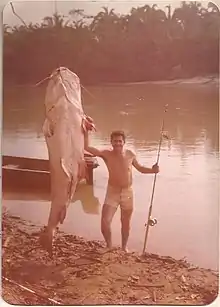Brachyplatystoma filamentosum
Brachyplatystoma filamentosum, the piraíba or kumakuma, is a species of large catfish of the family Pimelodidae and genus Brachyplatystoma that is native to Amazon and Orinoco River basins and fluvials in Guianas and northeastern Brazil.[1][2]
| Brachyplatystoma filamentosum | |
|---|---|
| Scientific classification | |
| Kingdom: | Animalia |
| Phylum: | Chordata |
| Class: | Actinopterygii |
| Order: | Siluriformes |
| Family: | Pimelodidae |
| Genus: | Brachyplatystoma |
| Species: | B. filamentosum |
| Binomial name | |
| Brachyplatystoma filamentosum (Lichtenstein, 1819) | |
| Synonyms | |
| |
Distribution
It is a much widespread species that is found rivers and estuaries of Amazon and Orinoco watersheds, Guianas and northeastern Brazil.[2]
Description
It grows to a length of 2.8 m.[1] The largest Amazon Piraíba records 2 – 2.5 m weighing more than 150 kg.
Dorsum dark to light grey with small dark spots on caudal-fin or peduncle. Dorsal fin with pink shading. Caudal fin deeply-forked. Juveniles exhibit dark body spots or blotches.[3]
It is entirely piscivorous preying on loricariids and other bottom-dwelling fish.[3]

Ecology
It is found in both freshwater and brackish water systems. It is a demersal potamodromous fish commonly inhabits deeper, flowing channels with soft bottoms.[2]
Uses
Though a massive species, Piraíba is considered as a game fish and commercial fish. Generally a harmless fish, it is known to be an obligate piscivore, however, stomach contents are said to include parts of monkeys.[4]
References
- Froese, Rainer and Pauly, Daniel, eds. (2020). "Brachyplatystoma filamentosum" in FishBase. June 2020 version.
- "Cat-eLog - Pimelodidae - Brachyplatystoma vaillantii". Planet Catfish. Retrieved 2020-06-02.
- "Brachyplatystoma ilamentosum (LICHTENSTEIN, 1819) - Piraíba". Seriously Fish. Retrieved 2020-06-02.
- "Kumakuma (Brachyplatystoma filamentosum) Ecological Risk Screening Summary" (PDF). fws.gov. Retrieved 2020-06-02.